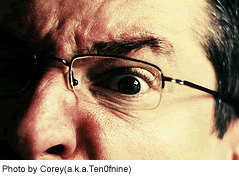Published today The Pattern Recognition Theory of Humour by Alastair Clarke answers the centuries old question of what is humour. Clarke explains how and why we find things funny and identifies the reason humour is common to all human societies, its fundamental role in the evolution of homo sapiens and its continuing importance in the cognitive development of infants.
Clarke explains: “For some time now it’s been assumed that a global theory of humour is impossible. This theory changes thousands of years of incorrect analyses and mini-theories that have applied to only a small proportion of instances of humour. It offers a vital answer as to why humour exists in every human society” [continue reading…]
 Did you know that one person in 20 has had a fight with a next-door neighbour? That one driver in four admits to committing an act of road rage? That cases of “air rage” rose by 400 per cent between 1997 and 2000? That stress has overtaken the common cold as the main reason for taking time off work?
Did you know that one person in 20 has had a fight with a next-door neighbour? That one driver in four admits to committing an act of road rage? That cases of “air rage” rose by 400 per cent between 1997 and 2000? That stress has overtaken the common cold as the main reason for taking time off work?
Link to read this Times Article written by Carol Midgley,
Published 13 June 2008Â
Â
The BPS Research Digest’s Special Issue spotter this week provides a link to
Ethics in psychotherapy  (Journal of Clinical Psychology). This issue of the journal covers ethical dilemmas that psychologists face. I came across this interesting feature in The New York Magazine on the sorts of ethical problems patients and medical doctors are now facing, New York identified six real cases from city hospitals representing a variety of issues and asked a panel of ten medical ethicists affiliated with local hospitals, medical schools, and medical think tanks to weigh in.
I was particularly struck by the feature ‘A family fights over continuing their mother’s care’.Â
AÂ mother of four children entered the hospital after suffering a massive stroke and was put on a ventilator. Doctors believed that she would not regain brain function. One of her sons got to the hospital first and told doctors that should his mother suffer heart failure or any other irreversible complication, no measures should be taken to save her life. Doctors worked under that assumption until one of the woman’s daughters arrived and claimed that her brother wasn’t interested in helping their mother. He had pushed to put their mother in a nursing home, the sister said, and added that she wanted to do everything possible to extend her mother’s life. The mother was widowed and hadn’t specified which of her children was to make decisions on her behalf. Doctors had to choose whose wishes to follow.
I recently lost a dementing parent who had not put in place any  clear guidelines with regard to care in his final years. Estranged from my siblings, I was neither consulted or involved in any decisions about my fathers medical care. Despite the introduction of the Mental Health Act in 2007 in the UK, my personal experiences highlighted how flawed and open to abuse this process can be.
Link to read this series of articles on 6 vexing medical and ethical dilemmas.
Source: The New York Magazine
Â

